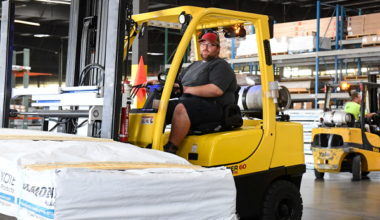How to Apply for Work in USA This Year – The United States of America often referred to as the “land of opportunity,” has long been a magnet for individuals seeking employment and career prospects. The diverse and dynamic job market, along with its reputation for innovation and entrepreneurship, has made USA a top destination for both native-born citizens and immigrants alike. Work in USA encompasses a wide range of industries, professions, and opportunities, making it a fascinating and complex landscape to explore.
The American workforce is known for its diversity, with people from various cultural backgrounds, educational levels, and skill sets contributing to the nation’s economic vitality. Whether you are a recent college graduate, a seasoned professional, or an international job seeker, USA offers a multitude of pathways to pursue your career aspirations.
In this post, we will delve into various aspects of working in USA, including the country’s job market dynamics, employment opportunities, legal considerations for foreign workers, and the cultural nuances that shape the American workplace. We will also explore the essential steps to secure employment, such as crafting a compelling resume, navigating the job search process, and understanding the benefits and challenges of working in this diverse and dynamic nation.
From the bustling streets of New York City to the technology hubs of Silicon Valley, from the agricultural heartlands of the Midwest to the healthcare centers of the South, the USA offers a vast array of work environments and career paths. Whether you are drawn to the fast-paced world of finance, the creative industries of entertainment and media, or the cutting-edge innovations of the technology sector, USA provides a platform for pursuing your professional dreams.
So without further ado, let’s get started…
Types of Work in USA Available For Foreigners
The United States has long been a popular destination for foreigners seeking employment opportunities. The country’s diverse economy offers a wide range of job options for foreign workers across various industries.
We’ll explore some of the types of work available for foreigners in USA.
1. Information Technology (IT) and Software Development:
The tech industry in USA is booming, and there is a constant demand for skilled IT professionals and software developers. Foreign workers with expertise in programming, cybersecurity, data analysis, and related fields often find lucrative job opportunities in Silicon Valley and tech hubs across the country.
2. Healthcare:
The healthcare sector in USA is vast and diverse, offering numerous opportunities for foreign medical professionals, including doctors, nurses, pharmacists, and therapists. Many healthcare institutions actively recruit internationally to fill shortages in certain areas.
3. Engineering:
Engineers, particularly those with backgrounds in fields like civil, mechanical, electrical, and aerospace engineering, are highly sought after in USA. The country’s infrastructure development and innovation drive the demand for skilled engineers.
4. Finance and Banking:
Major financial centers like New York City offer a plethora of opportunities for foreign workers in finance and banking. Roles in investment banking, financial analysis, and accounting are commonly available.
5. Education and Academia:
USA has a robust education system, and many institutions hire foreign professors, researchers, and educators. This includes opportunities in universities, research institutions, and language schools.
6. Hospitality and Tourism:
The tourism industry in USA is substantial, creating jobs in hotels, restaurants, and entertainment venues. Foreign workers often find employment in roles such as chefs, hotel managers, tour guides, and more.
7. Construction and Skilled Trades:
Skilled labor is in demand in the construction industry. Foreigners with expertise in carpentry, plumbing, electrical work, and other trades can find opportunities, especially in growing urban areas.
8. Agriculture and Farming:
The agricultural sector in USA relies on seasonal foreign labor for tasks such as harvesting crops and tending to livestock. The H-2A visa program is designed for temporary agricultural workers.
9. Retail and Customer Service:
Retail jobs, including sales associates, cashiers, and customer service representatives, are available in malls, stores, and call centers across the country. Fluency in English and good interpersonal skills are often required for these positions.
10. Creative and Arts Industries:
The entertainment, film, and arts sectors in cities like Los Angeles and New York City provide opportunities for actors, musicians, designers, and artists. However, competition can be fierce in these fields.
11. Consulting and Management:
Management consultants and business analysts are often recruited by American firms to provide expertise and strategies to improve business operations.
12. Nonprofit and NGO Work:
Many international organizations and nonprofit agencies are headquartered in USA. These organizations hire foreign workers in roles related to humanitarian aid, development, and advocacy.
13. Entrepreneurship and Startups:
USA has a thriving startup ecosystem, and foreign entrepreneurs can explore opportunities to launch their businesses through various visa programs, such as the E-2 Investor Visa or the O-1 Visa for individuals with extraordinary abilities.
14. Remote and Freelance Work:
With the growth of the gig economy and remote work, foreigners can often work for American companies from their home countries, provided they have the necessary skills and equipment.
Popular Jobs in USA and How Much They Earn
Popular jobs in USA can vary depending on the region, industry, and the current job market. Additionally, salary ranges can fluctuate based on factors such as experience, education, and location.
Please note that these figures are approximate and can vary based on factors such as location, experience, and demand for specific skills.
Here are some popular jobs in USA and their approximate median annual salaries. Keep in mind that these figures may have changed since then due to inflation and other economic factors:
1. Software Developer/Engineer:
Software developers create and maintain computer software and applications. Median salary varies but can range from $80,000 to $120,000 or more.
2. Registered Nurse:
Registered nurses provide patient care in hospitals, clinics, and other healthcare settings. Median salaries typically range from $60,000 to $90,000, depending on location and specialization.
3. Medical and Health Services Manager:
These professionals oversee healthcare facilities and ensure they run efficiently. Median salaries often exceed $100,000, with some earning well over $150,000.
4. IT Manager:
Information technology (IT) managers are responsible for the technology infrastructure of an organization. Median salaries typically range from $90,000 to $140,000 or more.
5. Data Scientist:
Data scientists analyze and interpret complex data to inform business decisions. Median salaries can range from $90,000 to $130,000 or higher.
6. Financial Manager:
Financial managers oversee an organization’s financial health. Median salaries often exceed $100,000 and can reach $150,000 or more.
7. Marketing Manager:
Marketing managers plan and execute marketing campaigns. Median salaries can range from $70,000 to $130,000 or more.
8. Electrician:
Electricians install and maintain electrical systems. Median salaries vary by location but can range from $50,000 to $80,000.
9. Teacher:
Teachers educate students at various levels, from elementary to high school. Median salaries vary by location and level of education but generally range from $50,000 to $70,000.
10. Mechanical Engineer:
Mechanical engineers design and oversee the production of mechanical systems. Median salaries can range from $70,000 to $100,000 or more.
11. Dental Hygienist:
Dental hygienists assist dentists in providing oral healthcare services. Median salaries typically range from $70,000 to $80,000.
12. Pharmacist:
Pharmacists dispense medications and provide healthcare advice. Median salaries often exceed $100,000.
13. Construction Manager:
Construction managers oversee construction projects. Median salaries range from $70,000 to $100,000 or more, depending on the size and complexity of the projects.
14. Lawyer:
Lawyers provide legal advice and representation. Median salaries can vary significantly but often exceed $100,000.
15. Physician:
Physicians diagnose and treat medical conditions. Median salaries for doctors vary widely by specialty but can be well over $200,000.
Visas To Apply For To Find Work In USA
Finding employment in the United States, often referred to as Work in USA, is a dream for many individuals worldwide due to the country’s diverse job opportunities, high standards of living, and vibrant economy.
To achieve this goal, understanding the various visa options available is crucial. The United States offers several visa categories that permit foreign nationals to legally work within its borders. We will explore some of the most common visa options for those seeking employment in USA.
1. H-1B Visa
The H-1B visa is one of the most sought-after visas for individuals looking to work in USA. It is designed for highly skilled foreign workers, particularly in specialized fields like IT, engineering, and healthcare. To obtain an H-1B visa, an employer in the USA must sponsor the applicant, offering a job that matches their qualifications and expertise. These visas are typically valid for three years and can be extended for up to six years.
2. L-1 Visa
The L-1 visa is ideal for employees of multinational companies who wish to transfer to a branch, affiliate, or subsidiary of their company in the United States. This visa has two categories: L-1A for managers and executives and L-1B for employees with specialized knowledge. It provides an opportunity to work in USA for a specific period, which can extend up to seven years.
3. E-2 Visa
The E-2 visa is for entrepreneurs and investors looking to establish or manage a business in USA. To qualify for this visa, individuals must make a substantial investment in a US-based enterprise and actively participate in its day-to-day operations. While there is no set minimum investment amount, the investment must be considered significant and create jobs for US workers.
4. O-1 Visa
The O-1 visa is reserved for individuals with extraordinary abilities or achievements in their field, whether in the arts, sciences, business, or athletics. To be eligible, applicants must demonstrate a high level of expertise and recognition in their respective areas. This visa allows them to work in USA for the duration of their project or employment opportunity.
5. TN Visa
Under the United States-Mexico-Canada Agreement (USMCA), Canadian and Mexican citizens can apply for TN visas to work in USA. TN visas are primarily for professionals in specific occupations, including engineers, scientists, and healthcare workers. These visas are renewable and grant temporary work authorization.
6. J-1 Visa
The J-1 visa program is designed for exchange visitors and provides opportunities for cultural exchange and practical training in USA. Participants can engage in internships, trainee programs, or academic studies while also gaining valuable work experience.
7. Optional Practical Training (OPT)
For international students studying in USA, Optional Practical Training (OPT) is an excellent way to gain work experience related to their field of study. OPT allows students on F-1 visas to work for up to 12 months (or up to 36 months for STEM degree graduates) in a position related to their major.
How To Find Work In USA
Finding work in USA can be an exciting and rewarding endeavor. With a vast job market, diverse industries, and opportunities for career growth, USA is a popular destination for job seekers from around the world.
Whether you’re a recent graduate, an experienced professional, or an international worker looking to relocate, this guide will provide you with valuable insights and strategies for securing employment in the United States.
1. Understand the Visa Requirements
Before you can start working in USA, it’s crucial to understand the visa requirements. Depending on your nationality, job type, and specific circumstances, you may need a work visa such as an H-1B, L-1, or E-2 visa. Research the visa options available to you and ensure you meet the eligibility criteria.
2. Build a Strong Resume and Cover Letter
Your resume and cover letter are your first impressions on potential employers. Tailor your documents to the American job market by highlighting relevant skills and experiences.
3. Network and Connect
Networking is a powerful tool in the job search process. Attend industry events, join professional associations, and connect with professionals on LinkedIn. Many job opportunities in USA are not advertised publicly, so networking can help you tap into the hidden job market.
4. Job Search Engines and Job Boards
There are numerous job search engines and job boards that list positions available throughout the USA. Websites like Indeed, Glassdoor, and LinkedIn can be valuable resources for job seekers. Use “Work in USA” as a search keyword to narrow down your options.
5. Utilize Company Websites
Research companies you’re interested in and visit their websites to check for job openings. Many organizations prefer to post vacancies on their own websites before using external job boards.
6. Contact Staffing Agencies
Consider working with staffing agencies or recruitment firms specializing in your field. They often have access to exclusive job opportunities and can assist with the application process.
7. Prepare for Interviews
Practice your interviewing skills and be prepared to discuss your qualifications, experiences, and how you can contribute to the company’s success.
8. Understand the Job Market
Different regions in USA have varying job markets and industries. Research the job market in your desired location and be open to opportunities in areas with a high demand for your skills.
9. Obtain Necessary Licenses and Certifications
Certain professions and industries in USA require specific licenses or certifications. Ensure you meet all the necessary qualifications and have the required documentation to work legally.
10. Stay Informed and Be Patient
The job search process can take time. Stay informed about changes in immigration policies, job trends, and industry developments. Be patient, persistent, and adaptable in your approach to finding work in USA.
Requirements to Get Work In USA
Working in the United States as a foreign national typically requires certain legal permissions and documentation. The specific requirements can vary depending on your citizenship, the type of work you intend to do, and your individual circumstances.
Here are some common requirements and considerations:
1. Work Visa or Employment Authorization:
Most foreign nationals need a work visa or employment authorization to work legally in the United States. The type of visa you need depends on your job and qualifications.
Common work visas include H-1B for skilled workers, L-1 for intracompany transferees, and J-1 for exchange visitors.
Some individuals, like spouses of certain visa holders (e.g., H-4 visa holders), may also be eligible for employment authorization.
2. Employer Sponsorship:
In many cases, you’ll need a job offer from a U.S. employer who is willing to sponsor your visa application. The employer may need to demonstrate that they cannot find a qualified U.S. worker for the position.
3. Labor Certification (PERM):
For certain employment-based visas, your employer may need to obtain a labor certification (PERM) from the U.S. Department of Labor, demonstrating that there is a shortage of qualified U.S. workers for the job.
4. Qualifications and Education:
Your qualifications and educational background may be a crucial factor in obtaining a work visa. Some visas, like the H-1B, require a minimum level of education or experience.
5. Health Insurance:
Some visas, such as the J-1 exchange visitor visa, may require you to have health insurance during your stay in the U.S.
6. Background Checks:
Applicants for certain visas may undergo background checks and security clearances.
7. Application Process:
The application process for a work visa can be complex and time-consuming. It typically involves submitting various forms, supporting documents, and paying fees. You may need to attend an interview at a U.S. embassy or consulate.
8. Duration and Renewal:
Work visas have a specific duration. Some are temporary, while others can lead to permanent residency (green card). You may need to renew your visa or adjust your status if you plan to continue working in the U.S.
9. Compliance with Visa Terms:
Once you have a work visa, it’s essential to comply with its terms and conditions. Violating visa rules can lead to deportation or future immigration problems.
10. Taxation:
While working in the U.S., you’ll be subject to U.S. taxation laws. You should understand your tax obligations and consider consulting a tax professional.
How to Apply for Work in USA
Applying for work in the United States involves several steps, including researching potential employers, preparing your application materials, and navigating the visa or immigration process if you are not a U.S. citizen or permanent resident.
Here’s a general guide on how to apply for work in USA:
1. Determine Your Eligibility:
Ensure that you are eligible to work in the United States. This may depend on your citizenship status, visa type, and employment authorization. The most common ways to work legally in the U.S. include:
- U.S. citizenship or permanent residency (Green Card).
- Temporary work visas, such as H-1B, L-1, O-1, or J-1, if you are not a U.S. citizen or permanent resident.
- Optional Practical Training (OPT) or Curricular Practical Training (CPT) for international students on F-1 visas.
- Asylum or refugee status.
- Employment-based Green Cards.
2. Research and Network:
Research companies and industries in the U.S. to identify potential employers.
Use professional networking platforms like LinkedIn to connect with professionals in your field and explore job opportunities.
Attend job fairs and networking events, both in person and online, to build connections and learn about job openings.
3. Prepare Your Application Materials:
Create or update your resume and cover letter, tailored to the U.S. job market.
Gather relevant documents, such as transcripts, diplomas, certifications, and reference letters.
Develop an online professional presence, including a LinkedIn profile.
4. Job Search:
Use online job search engines like LinkedIn, Indeed, Glassdoor, and company websites to look for job openings.
Apply for jobs that match your skills and qualifications.
Customize your applications for each job, highlighting relevant experience and skills.
5. Interview and Selection Process:
If selected, you may undergo several rounds of interviews, which could include phone or video interviews and in-person interviews.
Prepare for interviews by researching the company, practicing common interview questions, and showcasing your skills and experience.
Be prepared for background checks and reference checks.
6. Visa or Immigration Process:
If you are not a U.S. citizen or permanent resident, you will need to secure the necessary visa or employment authorization. This typically involves employer sponsorship.
Your employer may need to file a petition on your behalf, and you may need to attend a visa interview at a U.S. embassy or consulate in your home country.
7. Acceptance and Onboarding:
Once you receive a job offer and obtain the necessary work authorization, you can accept the offer.
Prepare for your move to the U.S., including securing housing, understanding tax requirements, and planning for healthcare.
8. Compliance and Legal Requirements:
Ensure that you follow all U.S. labor laws and regulations, including tax filings, work permits, and any visa-related obligations.
Websites To Find Work In USA
There are several websites where you can search for job opportunities in USA. Here are some popular ones:
1. LinkedIn (www.linkedin.com):
LinkedIn is a professional networking platform that also hosts a robust job search feature. You can search for jobs by location, industry, company, and job title.
2. Indeed (www.indeed.com):
Indeed is a popular job search engine that aggregates job listings from various sources, including company websites and job boards. You can search for jobs by location and keywords.
3. Glassdoor (www.glassdoor.com):
Glassdoor not only provides job listings but also offers company reviews, salary information, and interview insights. It’s a valuable resource for researching companies and job opportunities.
4. Monster (www.monster.com):
Monster is another job search engine that has a wide range of job listings across various industries and locations.
5. CareerBuilder (www.careerbuilder.com):
CareerBuilder is a job search website that offers a variety of job listings, including full-time, part-time, and temporary positions.
6. USAJOBS (www.usajobs.gov):
If you’re interested in federal government jobs, USAJOBS is the official job board for the U.S. federal government. You can find positions with various agencies and departments.
7. Dice (www.dice.com):
Dice is a specialized job board for tech professionals, making it a great resource if you’re looking for technology-related jobs.
8. SimplyHired (www.simplyhired.com):
SimplyHired is a job search engine that provides a straightforward interface for searching and applying for jobs.
9. Idealist (www.idealist.org):
Idealist is a job board for nonprofit and socially-oriented positions, making it a good choice if you’re looking for opportunities in the nonprofit sector.
10. ZipRecruiter (www.ziprecruiter.com):
ZipRecruiter is another job search engine that allows you to search for jobs by location and keywords.
11. Snagajob (www.snagajob.com):
Snagajob specializes in hourly and part-time job listings, which can be helpful if you’re seeking work in the service industry or similar fields.
Why You Should Work In USA
Finding work in USA can offer numerous benefits and opportunities. Here are some of the perks of working in the United States:
1. High Income Potential:
USA is known for its competitive job market and high salaries, particularly in industries like technology, finance, healthcare, and engineering. You have the potential to earn a substantial income that can provide a high standard of living.
2. Diverse Job Market:
The United States has a diverse and dynamic job market with opportunities in various industries and sectors. This diversity can be especially appealing if you have a specific skill set or are looking for opportunities for career growth and advancement.
3. Career Opportunities:
USA is home to many multinational corporations, tech giants, and innovative startups. Working in such companies can provide you with valuable experience and networking opportunities that can advance your career.
4. Education and Training:
USA offers access to world-renowned educational institutions and training programs. If you’re interested in furthering your education or skill set, you can take advantage of the numerous academic and vocational options available.
5. Cultural Diversity:
The United States is a melting pot of cultures and backgrounds. Working in such a diverse environment can expose you to different perspectives, enhance your cultural awareness, and broaden your horizons.
6. Healthcare Benefits:
Many employers in USA offer health insurance benefits as part of their compensation packages, which can help cover medical expenses for you and your family.
7. Retirement Benefits:
Some employers provide retirement plans like 401(k)s, which can help you save for your future. These plans often come with employer contributions, making them a valuable long-term benefit.
8. Networking Opportunities:
USA is home to a vast professional network, and working here can provide you with opportunities to connect with industry leaders, attend conferences, and build a strong professional network.
9. Innovation and Entrepreneurship:
If you have entrepreneurial aspirations, USA offers a supportive ecosystem for startups and innovation. Access to venture capital, mentorship, and resources can help you turn your ideas into reality.
10. Quality of Life:
While the cost of living varies by region, USA offers a high quality of life with access to modern amenities, healthcare, education, and a diverse range of recreational activities.
11. Legal Protections:
USA has a robust legal framework that protects workers’ rights, including minimum wage laws, workplace safety regulations, and anti-discrimination laws.
12. Global Experience:
Working in USA can provide you with valuable global experience, making you more attractive to employers worldwide. It can also enhance your cultural awareness and adaptability.
Frequently Asked Questions
1. How can I work in USA legally?
To work in USA legally, you generally need a valid work visa or employment authorization. Work in USA is subject to immigration laws and regulations, so it’s essential to obtain the appropriate visa, such as an H-1B, L-1, or E-2 visa, depending on your situation and qualifications. Ensure you meet all the requirements and follow the application process carefully.
2. What is the process for obtaining a work visa to work in USA?
The process for obtaining a work visa to work in USA can vary depending on the type of visa you need. Typically, it involves finding a U.S. employer who will sponsor your visa, completing the required forms, attending an interview at the U.S. embassy or consulate, and meeting specific eligibility criteria. Consult the U.S. Citizenship and Immigration Services (USCIS) website for detailed information on the application process.
3. Are there any work opportunities for international students in USA?
Yes, international students in USA can often work on or off-campus during their studies and even after graduation through Optional Practical Training (OPT) or Curricular Practical Training (CPT). These programs allow students to gain valuable work experience in their field of study.
4. What is the Green Card lottery, and how does it relate to working in USA?
The Green Card lottery, officially known as the Diversity Visa (DV) program, is a U.S. government program that randomly selects individuals from eligible countries to receive permanent resident status (Green Cards) in the USA. While winning the lottery grants you the right to live and work in the USA, it’s a highly competitive process, and not everyone qualifies.
5. Can I work in USA as a freelancer or independent contractor?
Yes, you can work in USA as a freelancer or independent contractor, but you will need the appropriate work visa or authorization, such as an O-1 visa for individuals with extraordinary abilities or an E-2 visa for treaty investors. Make sure you understand the visa requirements and tax implications for freelancers.
6. How do I find job openings and employers willing to sponsor my work visa in USA?
To find job openings and employers willing to sponsor your work visa in USA, you can use job search websites, network with professionals, attend career fairs, and reach out to companies that have a history of hiring international talent. Additionally, consulting immigration attorneys or experts can provide valuable guidance.
7. What are the key factors to consider when relocating for work in USA?
When relocating for work in USA, consider factors such as your visa status, job offer terms, cost of living in your chosen city, housing, healthcare, and cultural adjustments. It’s essential to plan your move carefully to ensure a smooth transition.
8. Can I work remotely for a foreign company while staying in USA on a tourist visa?
No, you cannot work remotely for a foreign company while on a tourist visa (B-1/B-2). Tourist visas do not allow for any employment in USA. Engaging in unauthorized work can lead to serious immigration consequences.
9. What are the steps to change my immigration status from a visitor to a work visa in USA?
To change your immigration status from a visitor to a work visa in the USA, you typically need to find an employer willing to sponsor your work visa, submit the appropriate application to USCIS, and follow the required procedures. It’s advisable to consult with an immigration attorney for guidance on this process.
Final Note
In conclusion, finding opportunities to work in USA can be a fulfilling and rewarding experience. The diverse job market, abundant career prospects, and the chance to embrace a new culture make work in USA an appealing option for many individuals worldwide. Whether you’re seeking professional growth or new adventures, pursuing work in USA can open doors to a world of possibilities.
It’s crucial to consult with a qualified immigration attorney or the U.S. Citizenship and Immigration Services (USCIS) website to get the most up-to-date and accurate information regarding your specific situation and visa requirements. Immigration laws and policies can change, so it’s important to stay informed throughout your application process.






